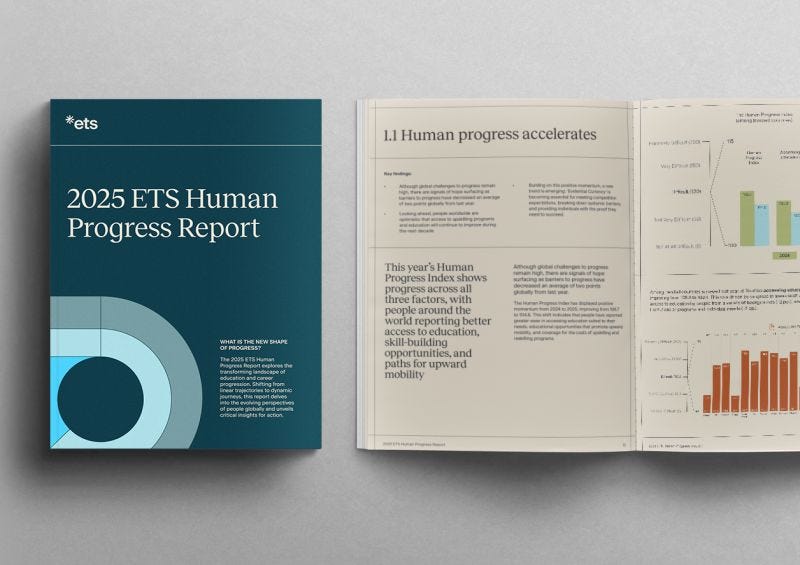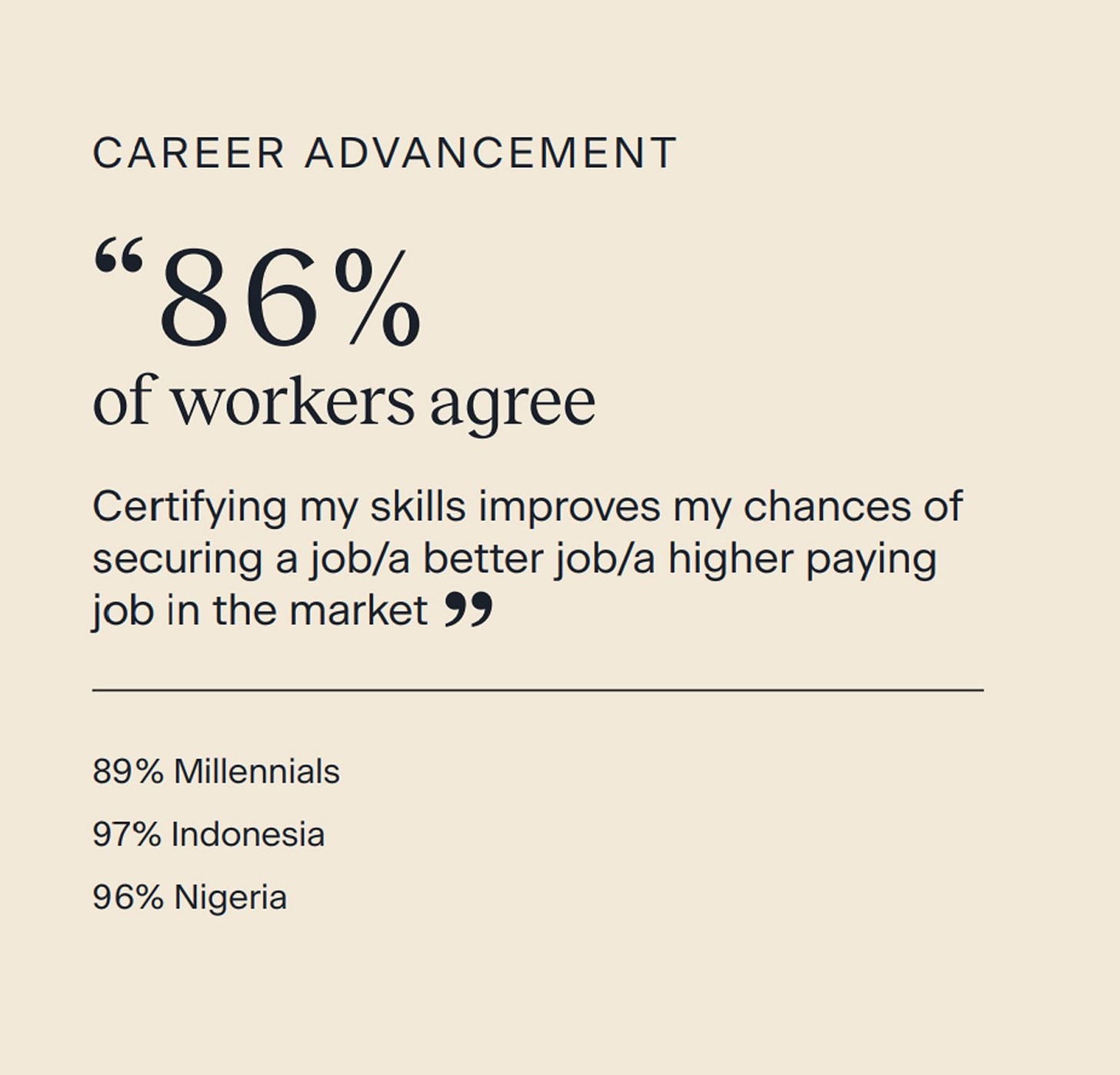The Rise of Evidential Currency: Why Skills Are the New Career Currency
From Davos: Your skills are about to become your most valuable asset and create the future of job security
Last week at Davos, our partner, ETS, revealed thought-provoking insights from The 2025 Human Progress Report, an immense study capturing the voices of 18,000 people across 18 countries. The World Economic Forum featured this research; CEO, Amit Sevak and CMO Michelle Froah were on stage talking about the research, and for good reason – it illuminates a path forward in our increasingly complex talent landscape.
Source: ETS The 2025 Human Progress Report
When analyzing this data, I couldn't help but feel its urgency. We're witnessing the rise of what we call "Fear of Being Obsolete" or "FOBO" – particularly among younger generations. The numbers tell the story: 60% of all employees report anxiety about becoming obsolete in their fields, rising to 65% among Gen Z workers. In response, people are taking ownership of their futures – 67% of all employees have obtained a skills credential, climbing to 72% among Gen Z employees.
Do you feel this sense of urgency and anxiety? I know I do.
The Current Crisis
The global talent landscape is at a breaking point. By 2030, according to the recent WEF The Future of Jobs Report, the job market faces massive disruption: 22% of jobs will transform, 170M new roles will emerge, and 40% of today's skills will evolve. As Denis Machuel perfectly captured it: "The challenge isn't creating jobs for life but building pathways so people don't become obsolete."
With over a quarter of the American workforce actively searching for new jobs – the highest rate in a decade – we're watching talent and opportunity miss each other in real-time. People have incredible skills and strengths yet are being filtered out by oversimplified bots that cannot see the full range of skills.
The pain points are everywhere. University prices in the US continue to soar (I'm looking at a potential ~$1M bill for my kids' education if things don't change). At the same time, our research with ETS shows that 4 in 5 recent US graduates immediately upskill after four years of expensive education. We have people around the globe hungry to put their talents to work and build security for their families, but today's pathways are murky and full of blockages.
A New Era: Evidential Currency
What this research points to is clear: we're entering a new era of need and desire, what we've coined "Evidential Currency." It's a future where real-world skills and capabilities become as valuable as traditional credentials. And people are ready for it. Crucially, this isn't just about technical skills – it's about evaluating and crediting durable skills like creativity, communication, and critical thinking that are often overlooked in screening processes but are mission-critical to operational and organizational success.
Signal #1: Skills = Security & Trajectory
People aren't waiting on the sidelines; they're actively reimagining their futures:
82% of workers say they are actively thinking about how to future-ready their careers to stay relevant in the job market
84% of respondents agree that upskilling and reskilling will become the new standard for people throughout their careers, especially college graduates (86%), Indonesians (94%), and Nigerians (90%).
This isn't just about survival - it's about thriving. People aren't just adapting; they're anticipating.
Signal #2: The System Isn’t Working
The current model isn't just expensive —it's ineffective:
55% of workers say they don't have a good understanding of how their skills compare to others in their industry
68% of respondents want skill development based on real-world assessments of what individuals can accomplish, drawing from diverse educational, professional, and social experiences.
86% of HR decision-makers in the US admit using college degrees as a filter is outdated and leaves talent on the table
89% HR decision-makers in the US say skills credentials are needed to bridge the gap between higher education and workforce readiness
Signal #3: The Global Hunger for Transparency
Remember playing video games? You always knew exactly where you stood. That is the same clarity people desire around their work.
74% of workers want to benchmark their skills against industry peers
Person-to-person (P2P) industry benchmarking is in exceptionally high demand among college graduates, early and mid-career professionals, those in technical roles, and those living in strengthening economies across Africa and Asia.
77% of college graduates
74% Gen Z, 76% Millennials (vs. 72% Gen X vs. 66% Baby Boomers)
82% of IT and 80% of technology workers
82% Indonesia, 82% Vietnam, 84% China, 85% India, 88% Kenya
72% of respondents say, “Earning skills credentials makes me feel like I’m progressing in my career development, education, or personal growth.”
Signal #3: The AI Opportunity
AI isn't just a threat – it's a potential democratizer of opportunity:
76% of respondents believe AI will create entirely new skills
70% of respondents would trust an AI coach for career guidance, rising to 75% among Millennials
Half of respondents wished they had access to AI Coaches, especially those in Mexico, Kenya, and Brazil
70% of employers want standardized ways to measure digital and AI literacy
This jumps to 85% in Indonesia, 82% in China, 79% in India and 77% in Latin America
Signal #4: The Economy of Evidential Currency By 2030
The shift is underway and developing quickly as we approach the later half of this decade
82% of respondents say that in the future, micro-credentials – or short-term, focused certificates or certifications – will become a valuable way to showcase skills.
60% of respondents globally expect verified resumes and digital skill wallets by 2030
62% of respondents say skills credentials would increase their motivation to keep learning.

Why This Matters Now
We're at a pivotal moment where three forces converge:
A broken traditional system that's failing to match talent with opportunity
Technology that can finally measure and validate skills at scale
Global readiness for a new way of proving capability
The Business Imperative
For organizations, this isn't just about hiring—it's about talent attraction
85% of employees value real-time feedback on skill development when considering new jobs
86% of employees prioritize personalized skill assessments when considering new jobs
Blue-collar workers actually express a stronger desire for learning partnerships than white-collar workers
Source: ETS The 2025 Human Progress Report
Looking Forward: 2035 and Beyond
By 2035, this won't be aspirational – it will be reality. We can now help craft the vision and create opportunities for people to develop their strengths and skills that align with real market needs. We can build a future where verified skills offer individuals the agency the ability to break free from static résumés and traditional hiring norms.
This isn't just another workplace trend. It's a fundamental reimagining of how we value human potential, where educational institutions, employers, and governments partner to build ecosystems that validate and celebrate diverse competencies. With these changes, evidential currency holds the potential for broad societal impact, advancing both personal prosperity and macroeconomic stability.
This is a future that personally excites me and makes me optimistic about my children’s future.
After all, in a world where the old system is visibly breaking, wouldn't we all benefit from a more real-time system that is tied to evergreen learning and human potential.
Big shout out to Tippy Ulicny, Marie Aloi, and Saskia Gregg, who led this report, along with our fantastic partners at ETS.
3 Links
Goodwall: the app for Gen Z to level up their skills, featured as a standout idea by The Atantic CEO Nicholas Thompson at Davos
Substack is doing interesting share outs like: Tune in Friday: Top finance and business experts share insights on what’s ahead in 2025 (Friday 1/31)
Can Tourism Foster Peace? These Socially Conscious Operators Say Yes (Bloomberg)
Curiosity is contagious; if you like this newsletter, please share it!!
Penned by Libby Rodney and Abbey Lunney, founders of the Thought Leadership Group at The Harris Poll. To learn more about the Thought Leadership Practice, just contact one of us or find out more here.















